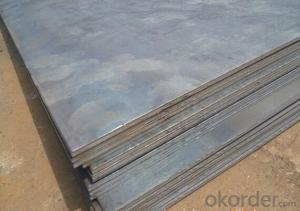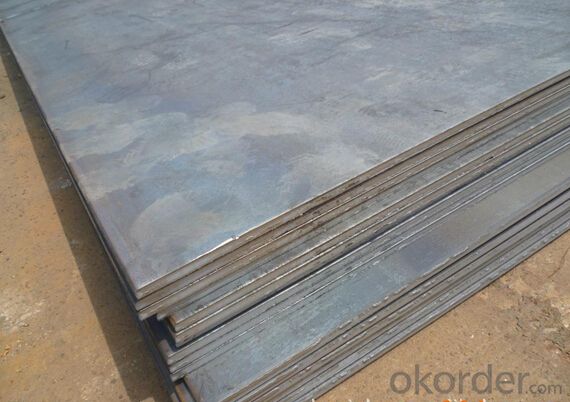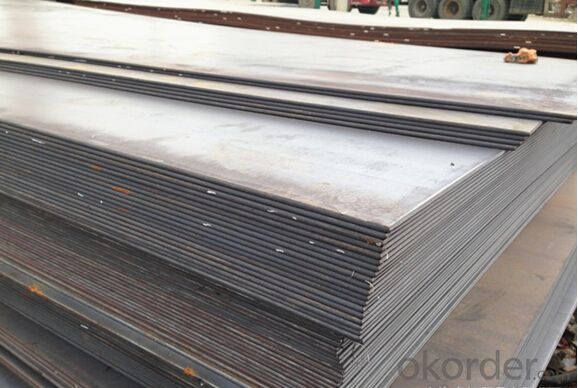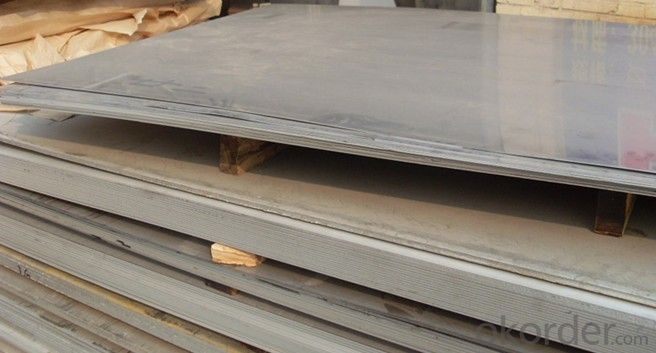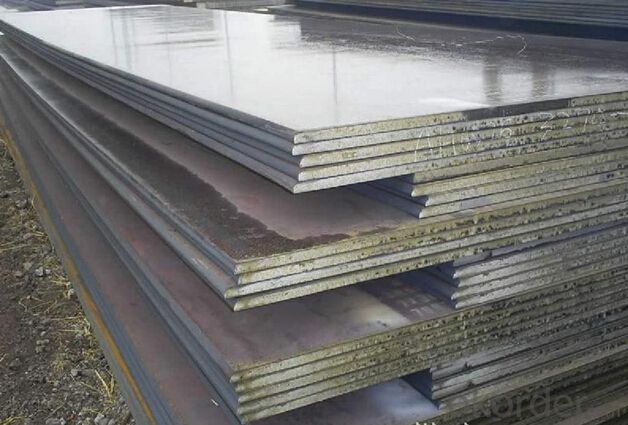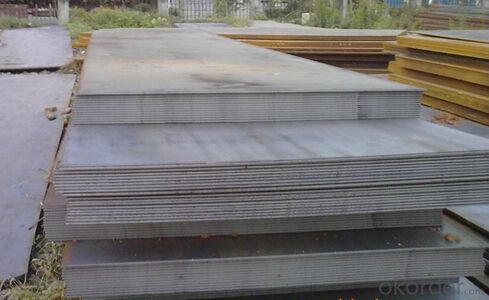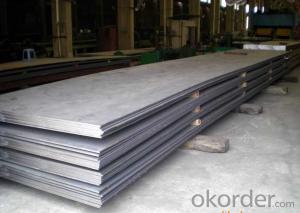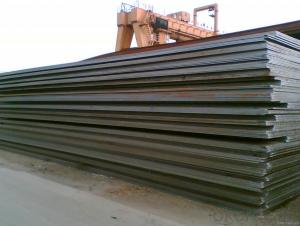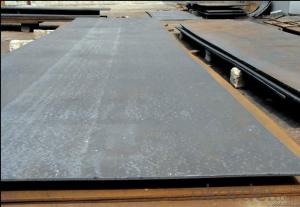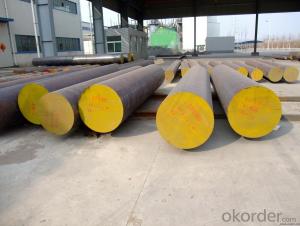DIN.1.2080Alloy Tool Steel D3 Mild Steel Plate in Stock
- Loading Port:
- Tianjin
- Payment Terms:
- TT OR LC
- Min Order Qty:
- 3 m.t.
- Supply Capability:
- 100000 m.t./month
OKorder Service Pledge
OKorder Financial Service
You Might Also Like
Specification
DIN.1.2080Alloy Tool Steel D3 Mild Steel Plate in Stock
Detailed Information of DIN.1.2080Alloy Tool Steel D3 Mild Steel Plate in Stock
| C | Si | P | S | yield Strength MAp | Tensile strength MAp | Elongation % | ||
| A36 | 0.24 | 0.4 | 0.045 | 0.03 | 250 | 400-520 | 26 | |
| C | Si | Mn | P | S | Cu | |||
| A283 | ≤0.27 | 0.15-0.4 | ≤0.9 | ≤0.035 | ≤0.04 | ≥0.2 | ||
| Thickness: | 6mm, 8mm, 12mm, 16mm, 20mm, 25mm, 30mm, 50mm, 80mm, 100mm, 150mm, 200mm | |||||||
| Width: | 1500mm, 1800mm, 2000mm, 2200mm, 2500mm | |||||||
| Length: | 6000mm, 8000m, can cut to width and length | |||||||
| Packing Details; | according to customer‘s require or export’s standard | |||||||
| Delivery time; | 7 days for stock sizes, 20-25 days for new production sizes | |||||||
| Port: | Tianjin China | |||||||
Related Products Overviews of DIN.1.2080Alloy Tool Steel D3 Mild Steel Plate in Stock
Product Name | Typical Grades | Diameter(mm) | Standard Adopted |
Carbon Steel | 20 (1020/S20C/C22) |
Ø16-Ø300 |
GB/SAE/ JIS/DIN |
40 (1040/S40C/C40) | |||
45 (1045/S45C/C45) | |||
Bearing Steel | GCr9 (51100/SUJ1) |
Ø12-Ø250 | |
GCr15 (52100/SUJ2/100Gr6) | |||
GCr9SiMn (A485-Gr.1/SUJ3) | |||
Cr-Mo Steel | 20Cr (5120/SCr420H/20Cr4) |
Ø12-Ø250 | |
40Cr (5140/SCr440/41Cr4) | |||
42CrMo(4140/SCM440/42CrMo4) | |||
Gear Steel | 20CrNiMo |
Ø16-Ø600 | |
20CrMn(5115/SMnC420/20MnCr5) | |||
20CrNiMo(8620/SNCM220/20CrMiMo2) |
Related Products Application of DIN.1.2080Alloy Tool Steel D3 Mild Steel Plate in Stock
Carbon Steel | l Mold bottom l Plastic mold l Construction machinery parts l Automobile parts l Security grills l Screens l Construction |
Bearing Steel | l Aerospace l Navigation l Nuclear energy l Chemical industry l Electronic information l Petrochemical l Instrument and meter l Transportation |
Cr-Mo Steel | l Mechanism & Fasteners gear l Stressed components for vehicles l Engines and machines l Parts of larger cross-section |
Gear Steel | l All kinds of gears l Statically and dynamically stressed component for vehicles l Engines and machine l Larger cross-section parts l Crankshafts |
Company Introduction of DIN.1.2080Alloy Tool Steel D3 Mild Steel Plate in Stock
CNBM International Corporation is the most import and export platform of CNBM group(China National Building Material Group Corporation) ,which is a state-owned enterprise, ranked in 270th of Fortune Global 500 in 2015.
With its advantages, CNBM International are mainly concentrate on Cement, Glass, Iron and Steel, Ceramics industries and devotes herself for supplying high quality series of refractories as well as technical consultancies and logistics solution.
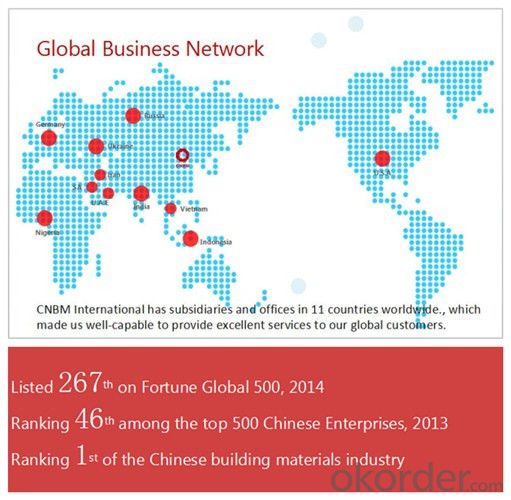
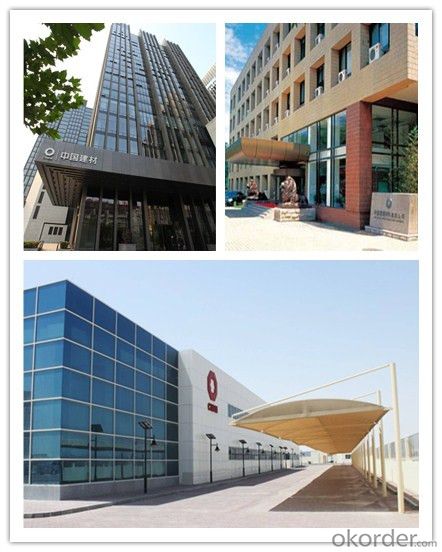
After-sale service | l CNBM provides the services and support you need for every step of our cooperation. We’re the business partners you can trust; you can relax and get on with doing business. l For any problem, please kindly contact us at any your convenient time, we’ll reply you in our first priority within 24 hours
|
Advantages
| l Industry experience over 20 years. l Shipment of goods -More than 70 countries worldwide. l The most convenient transport and prompt delivery. l Competitive price with best service. l High technical production line with top quality products. l High reputation based on best quality products.
|
Packaging & Delivery of DIN.1.2080Alloy Tool Steel D3 Mild Steel Plate in Stock
Packaging Detail | Sea worthy packing /as per customer's packing instruction |
Delivery Detail | 15 ~ 40 days after receiving the deposit |
Products Show
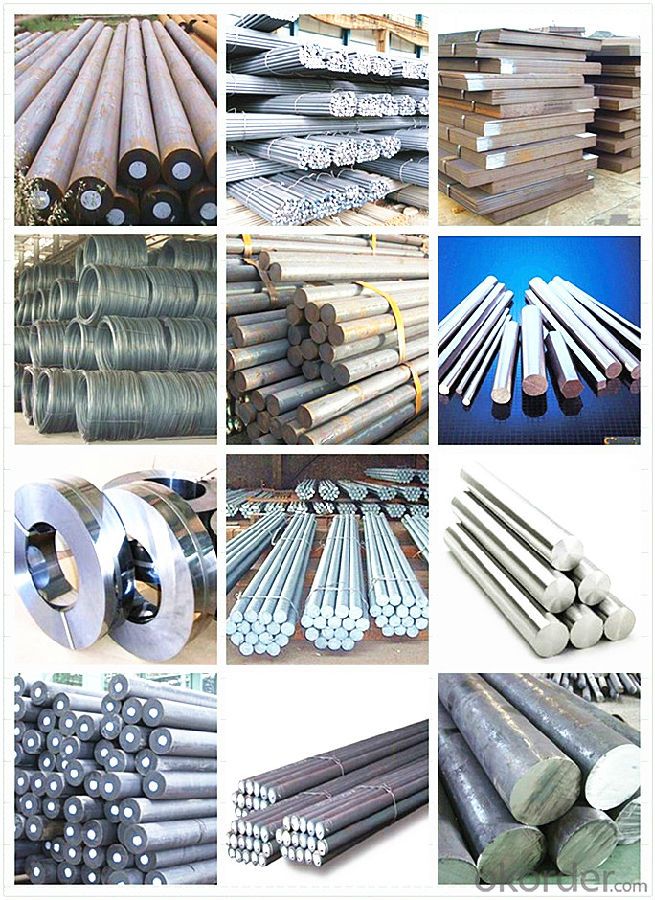
FAQ:
Are you a trading company or manufacturer? | Manufacturer |
What’s the MOQ? | 3 metric ton |
What’s your delivery time? | 15-35 days after downpayment received |
Do you Accept OEM service? | Yes |
what’s your delivery terms? | FOB/CFR/CIF |
What's the Payment Terms? | 30% as deposit,70% before shipment by T/T |
Western Union acceptable for small amount. | |
L/C acceptable for large amount. | |
Scrow ,Paybal,Alipay are also ok | |
Why choose us? | Chose happens because of quality, then price, We can give you both. Additionally, we can also offer professional products inquiry, products knowledge train (for agents), smooth goods delivery, excellent customer solution proposals. |
What's your available port of Shipment? | Main Port, China |
What’s your featured services? | Our service formula: good quality+ good price+ good service=customer's trust
|
Where are your Market? | Covering more than 160 countries in the world |
- Q: Is special steel suitable for manufacturing surgical instruments?
- Yes, special steel is suitable for manufacturing surgical instruments. Special steel is often used in the production of surgical instruments due to its high strength, corrosion resistance, and ability to maintain sharpness. It meets the stringent requirements of surgical procedures and ensures durability and reliability in medical settings.
- Q: How does special steel contribute to the renewable energy aftermarket industry?
- Special steel contributes to the renewable energy aftermarket industry by providing high-quality materials that enhance the performance and durability of renewable energy equipment. It is crucial for manufacturing wind turbines, solar panels, and energy storage systems, as it offers superior strength, corrosion resistance, and heat resistance. Special steel ensures the longevity and efficiency of renewable energy technologies, enabling the industry to thrive and meet the growing demand for sustainable energy solutions.
- Q: How is wear-resistant tool steel used in the production of cutting tools?
- Wear-resistant tool steel is commonly used in the production of cutting tools due to its high hardness and resistance to wear. This steel is able to withstand the abrasive forces and high temperatures generated during cutting operations, resulting in longer tool life and improved cutting performance. The wear-resistant tool steel is typically used to manufacture various cutting tools such as drills, milling cutters, saw blades, and lathe tools, ensuring durability and efficiency in metalworking and machining processes.
- Q: What are the main factors affecting the creep resistance of special steel?
- The creep resistance of special steel is determined by several factors, namely composition, microstructure, and processing conditions. The creep resistance is greatly affected by the composition of the steel. The presence of alloying elements like chromium, molybdenum, and vanadium can enhance creep resistance by forming stable precipitates or carbides that impede the movement of dislocations. These alloying elements also contribute to the formation of a protective oxide layer, which further improves resistance to creep. Microstructure is another crucial factor in determining creep resistance. Proper heat treatment or alloying can lead to the formation of fine-grained structures, which hinder dislocation movement and enhance material strength, thereby improving creep resistance. Grain boundaries also act as barriers to dislocation motion, reducing the rate of creep. Processing conditions, such as heat treatment and deformation processes, have a significant impact on creep resistance. The choice of heat treatment parameters, including temperature and cooling rate, can affect the precipitation of strengthening phases and the formation of an ideal microstructure. Appropriate deformation processing, such as hot or cold working, can refine the grain structure and enhance creep resistance. Temperature, stress, and time are additional factors that influence creep resistance. Higher temperatures accelerate creep deformation, while higher applied stresses increase the rate of creep. The duration of exposure to elevated temperatures and stresses also plays a role, as prolonged exposure can lead to creep failure. To summarize, the creep resistance of special steel is influenced by various factors, including composition, microstructure, processing conditions, temperature, stress, and time. By carefully considering and optimizing these factors, the creep resistance of special steel can be enhanced, making it suitable for applications that require high temperatures and long-term durability.
- Q: What are the requirements for special steel used in high-pressure applications?
- The requirements for special steel used in high-pressure applications typically include high strength, excellent resistance to corrosion and oxidation, good weldability, and the ability to withstand extreme temperatures and pressures without deformation or failure. Additionally, the steel should have a high level of toughness to withstand impact and fatigue loads, as well as good dimensional stability to ensure proper sealing and performance in high-pressure environments.
- Q: How does special steel contribute to the fatigue resistance of products?
- Special steel contributes to the fatigue resistance of products by providing enhanced strength, durability, and resistance to wear and tear. The unique composition and manufacturing processes of special steel result in improved mechanical properties, such as higher tensile strength and hardness, which help products withstand repeated loading and stress cycles without failure. Additionally, special steel can be engineered to have specific microstructures that enhance its resistance to fatigue, preventing the growth of cracks and ensuring longer product lifespan.
- Q: What are the different methods of coating special steel?
- There are several different methods of coating special steel to enhance its performance and protect it from corrosion or other forms of damage. Some of the commonly used methods include: 1. Galvanizing: This method involves coating the steel with a layer of zinc, either through hot-dip galvanizing or electroplating. The zinc layer provides excellent corrosion resistance and acts as a sacrificial anode, protecting the steel from rusting. 2. Powder coating: In this process, a dry powder is applied electrostatically to the steel surface and then cured under heat. The powder melts and fuses into a protective layer that provides an attractive finish, as well as resistance to chipping, scratching, and corrosion. 3. Electroplating: This method involves immersing the steel in a solution containing a metal ion, such as chromium or nickel, and passing an electric current through it. The metal ions are then deposited onto the steel surface, forming a thin protective layer that improves corrosion resistance and provides a decorative finish. 4. Cladding: Cladding involves bonding a layer of corrosion-resistant material, such as stainless steel or titanium, to the surface of the special steel. This method provides enhanced resistance to corrosion, wear, and heat, while maintaining the strength and mechanical properties of the base steel. 5. Thermal spraying: This method involves heating a coating material, such as zinc or aluminum, to a molten or semi-molten state and then spraying it onto the steel surface using compressed air or a similar method. The sprayed material forms a protective layer that offers excellent corrosion resistance and can also provide other functional properties, such as thermal insulation or electrical conductivity. 6. Chemical conversion coating: This method involves treating the steel surface with a chemical solution that reacts with the surface to form a thin layer of a protective compound, such as phosphate or chromate. The conversion coating provides enhanced corrosion resistance and can also improve the adhesion of subsequent coatings. These are just a few of the many methods available for coating special steel. The choice of method depends on factors such as the desired properties, the intended application, and the budget constraints. It is important to select the most appropriate coating method to ensure the longevity and performance of the special steel.
- Q: What are the different methods of surface coating for special steel?
- For special steel, there exists a variety of surface coating methods that can be utilized based on the desired outcome and application. Some of the most frequently employed techniques are as follows: 1. Electroplating: By employing an electric current, a thin layer of metal can be deposited onto the surface of the steel. This process enhances the steel's corrosion resistance, wear resistance, and overall aesthetic appearance. 2. Hot-dip galvanizing: This method entails immersing the steel in molten zinc, resulting in the formation of a protective coating on the surface. Hot-dip galvanizing offers exceptional corrosion protection and can be utilized for both interior and exterior applications. 3. Powder coating: This technique involves the application of a dry powder onto the steel's surface, followed by heating and curing to create a durable and visually appealing coating. Powder coating provides excellent corrosion resistance, impact resistance, and allows for customization of colors. 4. Physical vapor deposition (PVD): PVD is a vacuum coating process where thin layers of metal are deposited onto the steel's surface. This method enhances the steel's hardness, wear resistance, and chemical resistance. It is commonly employed for decorative finishes and to improve the performance of cutting tools. 5. Chemical conversion coating: This method entails treating the steel surface with a chemical solution, which reacts with the surface to form a protective coating. Chemical conversion coatings provide corrosion resistance and can serve as a base for painting or other coatings. 6. Thermal spraying: Thermal spraying involves melting or heating a coating material and projecting it onto the steel surface using a spray gun. This technique can be utilized to apply a wide range of coatings, including metals, ceramics, and polymers. Thermal spraying improves the steel's wear resistance, corrosion resistance, and thermal insulation properties. These examples merely scratch the surface of the available surface coating methods for special steel. The choice of method relies on factors such as desired properties, application requirements, and budget. Consulting with experts in the field is crucial to determine the most suitable coating method for specific steel applications.
- Q: What are the properties of ultra-high-strength steel?
- Ultra-high-strength steel possesses exceptional mechanical properties, including high tensile strength, excellent toughness, and superior fatigue resistance. It exhibits high stiffness, enabling it to withstand heavy loads and maintain its shape even under extreme conditions. With its low weight and high strength-to-weight ratio, this steel offers enhanced fuel efficiency and increased payload capacity. Additionally, it exhibits good weldability, corrosion resistance, and is often used in applications where both strength and durability are paramount, such as in automotive, aerospace, and construction industries.
- Q: How does special steel perform in terms of magnetic properties?
- Special steel can exhibit a wide range of magnetic properties depending on its composition and processing. Some special steels, such as stainless steel, are generally non-magnetic or have very low magnetic permeability. However, certain types of special steel, such as tool steel or high-speed steel, can be engineered to possess magnetic properties suitable for specific applications, such as magnetic tools or electrical transformers. Overall, the magnetic properties of special steel can be tailored to meet the desired requirements for different applications.
Send your message to us
DIN.1.2080Alloy Tool Steel D3 Mild Steel Plate in Stock
- Loading Port:
- Tianjin
- Payment Terms:
- TT OR LC
- Min Order Qty:
- 3 m.t.
- Supply Capability:
- 100000 m.t./month
OKorder Service Pledge
OKorder Financial Service
Similar products
Hot products
Hot Searches
Related keywords
